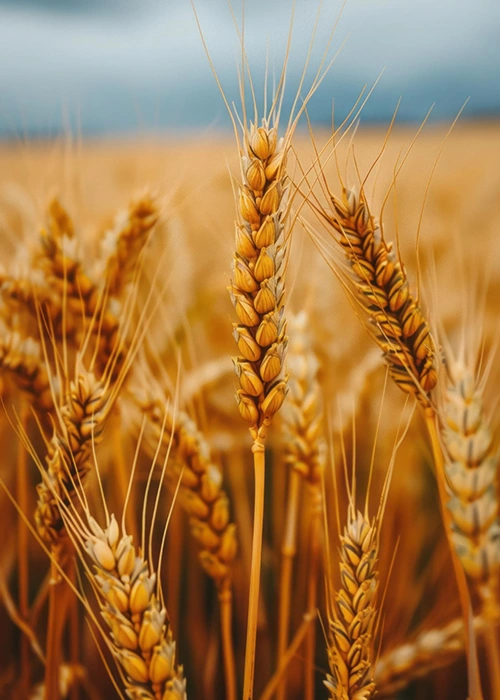Barley
Barley is a versatile cereal grain that has been consumed for thousands of years. It is known for its nutty flavor and numerous health benefits, making it a popular choice in many cuisines around the world.
Exploring the Culinary Versatility of This Nutritious Grain
Barley is a versatile and nutritious grain with numerous features, benefits, and nutritional advantages. It comes in various forms, including hulled barley (whole grain) and pearled barley (partially polished). Known for its versatility, barley can be used in soups, stews, salads, and as a side dish. It is also a key ingredient in brewing beer and making malted beverages. Barley has a chewy texture and a mild, nutty flavor, making it a delightful addition to many dishes.
Barley offers several health benefits. It is rich in soluble fiber, particularly beta-glucan, which helps lower cholesterol levels and reduce the risk of heart disease. The fiber in barley also aids in blood sugar control by slowing the absorption of sugar, which can help manage blood sugar levels and reduce the risk of diabetes.
Additionally, barley is high in fiber and protein, promoting a feeling of fullness that can aid in weight management. Its fiber content supports healthy digestion and can help prevent constipation.
Essential Nutrients in Barley: Your Key to a Balanced Diet
Barley is rich in essential nutrients that make it a valuable addition to any balanced diet. A 1-cup serving (200 grams) of cooked barley contains:
- Calories: 193
- Protein: 3.5 grams
- Fat: 0.6 grams
- Carbohydrates: 44 grams
- Fiber: 6 grams
- Vitamin B3 (Niacin):11% of the Daily Value (DV)
- Manganese: 40% DV
- Selenium: 22% DV
- Copper: 20% DV
- Magnesium: 18% DV

Including barley in your diet can offer numerous health benefits while adding variety and texture to your meals.
Health Benefits of Barley
High in Fiber:
Barley is an excellent source of dietary fiber, with a higher content than many other grains. This high fiber content helps maintain digestive health, aids in weight management, and can improve cholesterol levels.
Rich in Antioxidants:
Barley contains several antioxidants that help protect cells from damage caused by free radicals. These antioxidants have been linked to a reduced risk of chronic diseases such as cancer and heart disease.
May Improve Heart Health:
Barley is a good source of beta-glucan, a type of fiber that has been shown to lower blood cholesterol levels and reduce the risk of heart disease.
May Aid in Blood Sugar Control:
The high fiber content and low glycemic index of barley may help regulate blood sugar levels and improve insulin sensitivity in individuals with diabetes.
How to Incorporate Barley into Your Diet
Barley can be enjoyed in a variety of ways, such as:
- As a side dish: Cooked barley makes for a nutritious side dish to accompany proteins, vegetables, or salads.
- In soups and stews: Add cooked barley to soups and stews for a hearty and filling meal.
- As a breakfast option: Use barley flakes or flour to make porridge, pancakes, or muffins.
- As a substitute for rice: Cooked barley can be used as an alternative to rice in dishes like risotto or stir-fry.

Frequently Asked Questions About Cassava
What are the nutritional benefits of barley?
Barley is rich in dietary fiber, providing significant amounts per serving, which aids in digestion and heart health. It also offers plant-based protein and essential nutrients like magnesium, iron, vitamin B6, phosphorus, and selenium. Additionally, barley contains antioxidants that help reduce inflammation and protect against chronic diseases.
How can I incorporate barley into my meals?
Barley is versatile and can be used in a variety of dishes. It can be added to soups and stews for extra texture, used as a base for salads, or served as a side dish. Its mild, nutty flavor and chewy texture make it an excellent addition to many recipes.
What health advantages does barley offer?
Barley supports heart health by helping to lower cholesterol levels and manage blood sugar. Its high fiber content promotes healthy digestion and can aid in weight management by providing a feeling of fullness. The antioxidants present in barley also contribute to reducing inflammation and safeguarding against chronic illnesses.
How should I store barley to maintain its freshness?
To keep barley fresh, store it in an airtight container in a cool, dry place. For long-term storage, you can refrigerate or freeze barley, which will help preserve its nutritional quality and prevent it from going rancid.
Can barley be a good substitute for other grains in recipes?
Yes, barley can be an excellent substitute for other grains like rice or quinoa in many recipes. Its unique texture and flavor can enhance dishes, providing a heartier and more nutritious option. Just remember to adjust cooking times, as barley often requires a longer cooking duration compared to some other grains.
Contact Us for More Information
Discover our diverse portfolio of quality dry food products from South and Central America that meet the unique tastes and preferences of the U.S. Hispanic market and the public.
